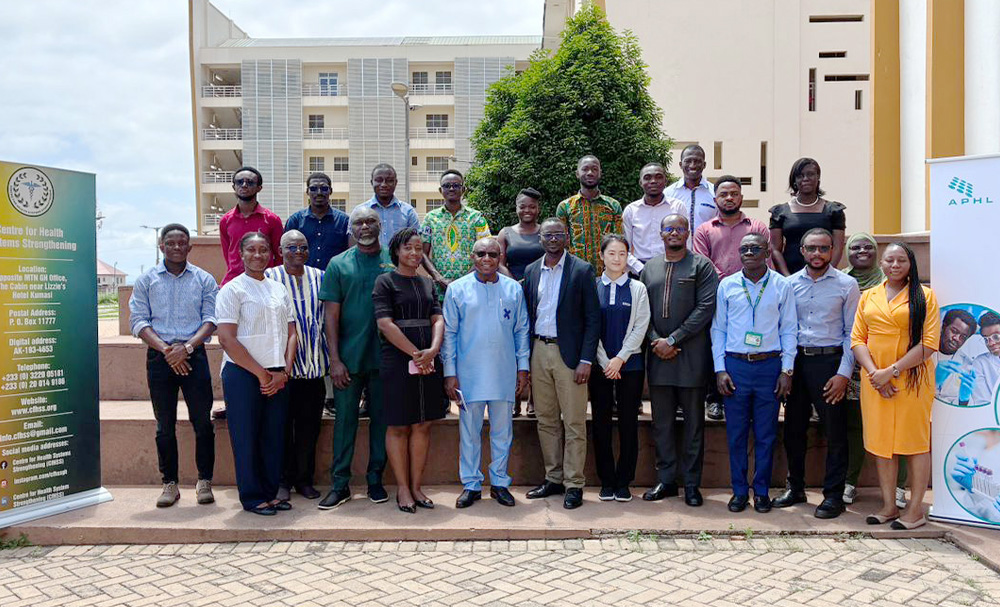
The Centre for Health Systems Strengthening (CfHSS), with funding support from the U.S. Centers for Disease Control and Prevention (CDC) under the Global Health Security Agenda (GHSA), has successfully implemented a two-phase national capacity-building training on Next Generation Sequencing (NGS) and Pathogen Discovery and Metagenomics.
Delivered in partnership with the Association of Public Health Laboratories (APHL), the National Public Health Reference Laboratory (NPHRL), the Ghana Health Service (GHS), and the Kwame Nkrumah University of Science and Technology (KNUST), the initiative sought to strengthen genomic surveillance capabilities, equip laboratories with practical sequencing skills, and enhance data analysis competencies using global bioinformatics platforms. Each phase spanned two weeks, combining lectures, laboratory work, and interactive data analysis sessions. More than ten (10) laboratory scientists, PhD students and lecturers from NPHRL, GIDL, Kumasi Public Health Lab (KPHL) and KNUST participated in the training.
Phase One: Next-Generation Sequencing Training at NPHRL (September 8–19, 2025)
The first phase was held at the National Public Health Reference Laboratory (NPHRL) in Accra, where participants were introduced to Oxford Nanopore Technology (ONT) sequencing workflows. The training covered sample preparation, sequencing run setup, and data interpretation, enabling participants to apply genomic tools in pathogen detection, outbreak investigations, and disease surveillance.
During this session, CfHSS leadership, together with representatives from APHL, KOICA, and CDC, emphasized the importance of genomic surveillance in strengthening Ghana’s public health systems.
Phase Two: Pathogen Discovery and Metagenomics Training at GIDL–KNUST (October 6–20, 2025)
The second phase took place at the Genomics and Infectious Disease Laboratory (GIDL) at KNUST, focusing on pathogen discovery and metagenomic applications for public health surveillance. Participants gained hands-on experience in metagenomic sequencing workflows, bioinformatics pipelines, and interpretation of microbial community data.
The Provost of the College of Health Sciences, Professor Christian Agyare, graced the opening session and commended CfHSS and its partners for their leadership in advancing Ghana’s scientific workforce. He highlighted the global threat of emerging and re-emerging pathogens and urged participants to leverage the training to enhance disease detection and response efforts.
Facilitators from APHL, CfHSS, KNUST, and the U.S. CDC led sessions on genome assembly, microbial profiling, and metagenomic data visualization. Participants also shared reflections on how the training will strengthen their work within Ghana’s public health laboratory network.
This two-phase training marks a major step in Ghana’s ongoing efforts to institutionalize genomic and metagenomic approaches within the public health laboratory system. It supports the implementation of the National Genomic Surveillance Strategy for Pathogens of Pandemic Potential, launched by the Ministry of Health in 2024, to improve preparedness and response to infectious disease threats.
The Director of CfHSS reaffirmed the organization’s commitment to advancing laboratory systems strengthening in Ghana:
“Our goal is to build a resilient public health laboratory system where genomic technologies are routinely used to detect, track, and respond to pathogens of public health importance.”
Through sustained collaboration and capacity development, CfHSS continues to champion innovation, biosafety, and quality management to advance health security in Ghana and beyond.

